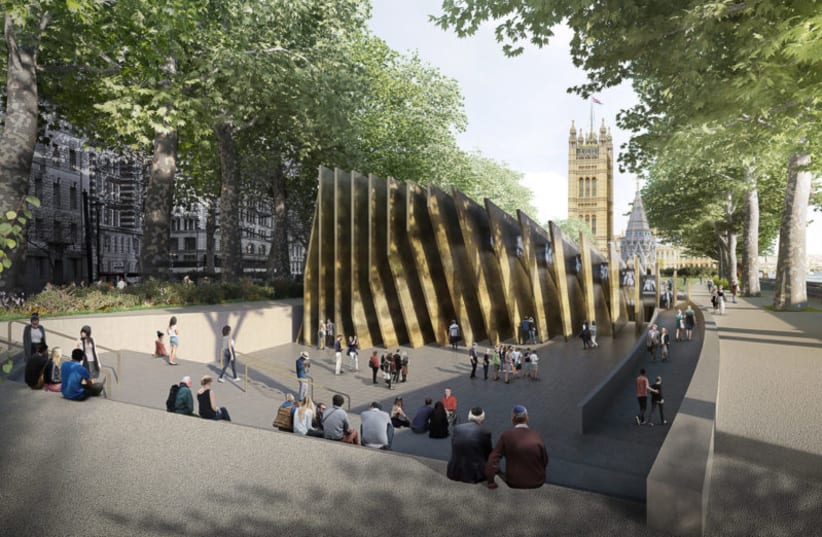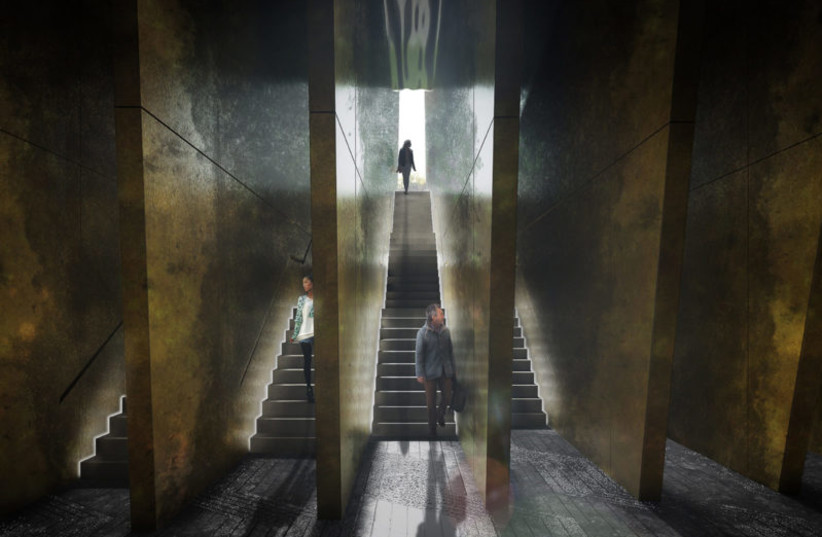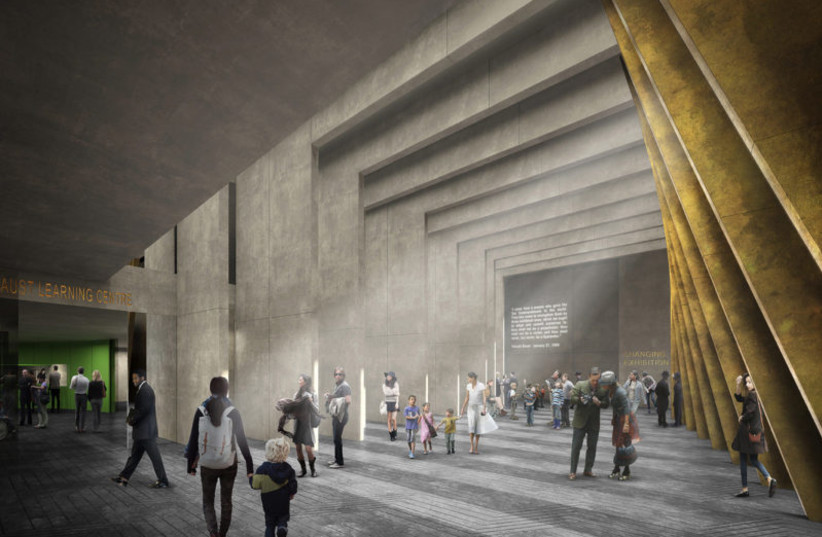LONDON – A major Holocaust memorial, set to be built in London’s Victoria Tower Gardens, has been approved after many years of debate.The memorial, to be built next to the Houses of Parliament, will feature an underground study center, and 23 bronze fins will be erected to represent the number of countries whose Jewish populations were persecuted during the Holocaust.
“The bronze fins serve as paths into the sunken entry hall,” explained designers Adjaye Associates and Ron Arad Architects. This “threshold,” as it is called, leads to the study center with survivor testimonies and a “Contemplation Court” where visitors can reflect in silence.
First proposed by prime minister David Cameron in 2016, the plans were rejected by the Westminster City Council’s planning committee amid opposition from local residents and several peers. The proposals were finally put through a public inquiry, which took place online last year, and the divisive project was finally green-lighted.
Backers of the £100 million project include London Mayor Sadiq Khan, Labour leader Keir Starmer, the Association of Jewish Refugees, the Holocaust Educational Trust and the Jewish Board of Deputies.
Supporters say the memorial will not just be a permanent reminder of the genocide of the Jewish people, but also as a prime opportunity to halt rising antisemitism worldwide.
Khan spoke of the memorial making “a powerful national statement about fighting intolerance” and the “scourge of antisemitism and hate crime,” while Starmer highlighted the need for “future generations to learn about the Nazi extermination program and subsequent genocides.”
Starmer offered his full support to the placement of the memorial by the Houses of Parliament, a location also praised by Jewish Board of Deputies President Marie van der Zyl, who told the enquiry that “there will be something uniquely powerful about locating a memorial to the Holocaust right next to the center of the UK’s democracy.”
Objectors, however, argued that a Jewish memorial being granted such a coveted London spot, falls into antisemites’ depiction of Jews as a privileged group receiving “special treatment.” They also expressed concern over the central location being the target of terrorist attacks.
Another aspect to draw criticism is the architectural design, described by free-speech activist Carl Benjamin as “hideous.” Others referred to the monument’s scale as being out of character for the famously tranquil oasis, frequented by over 3 million visitors a year.
There was an opposition campaign run by the vocal Save Victoria Tower Gardens group, and a letter sent to The Times by eight Jewish peers stated that the design “evoked neither the Holocaust nor Jewish history,” and local residents protested the loss of precious green space within Victoria Tower Gardens. There were even concerns raised over damage to mature trees, but Minister of State for Housing Chris Pincher has concluded that “the positives outweighed the negatives.”
A statement made by Ed Balls and Lord Eric Pickles, cochairs of the UK Holocaust Memorial Foundation, spoke of a national memorial that “properly commemorates the 6 million Jewish men, women and children and all others murdered by the Nazis,” but critics pointed to the Holocaust memorial in Hyde Park, in place since 1983.
Pickles is the parliamentary chairman of Conservative Friends of Israel and an outspoken supporter of the Jewish state. More than 170 MPs and peers have joined his support for the project, including parliamentarians representing constituencies with large Jewish populations.
In welcoming the memorial, Finchley and Golders Green MP Mike Freer highlighted recent events in his constituency that “have shown that there is still too much antisemitism in our society,” while Karen Pollock, CEO of the Holocaust Educational Trust, remarked on the Holocaust moving “from living memory to history,” stressing the urgent need to build “a reminder for generations to come of what happened when antisemitism and hatred were able to flourish.”
It should be noted that as well as the 6 million Jews killed, the memorial will commemorate the persecution and deaths of Roma, gay and disabled people.
Israeli architect Ron Arad and his partners set out to take visitors on a “multifaceted holistic, sensorial and emotive journey,” through the sequencing of highly immersive spaces – “it’s the walking through that is the memorial,” he explained.
Perhaps referring to antisemitic accusations of the Holocaust being “used for political gain,” Arad spoke of designing “something that is not trying to claim [the Holocaust] for any political purpose.”
The memorial will be open to visitors by 2025.


